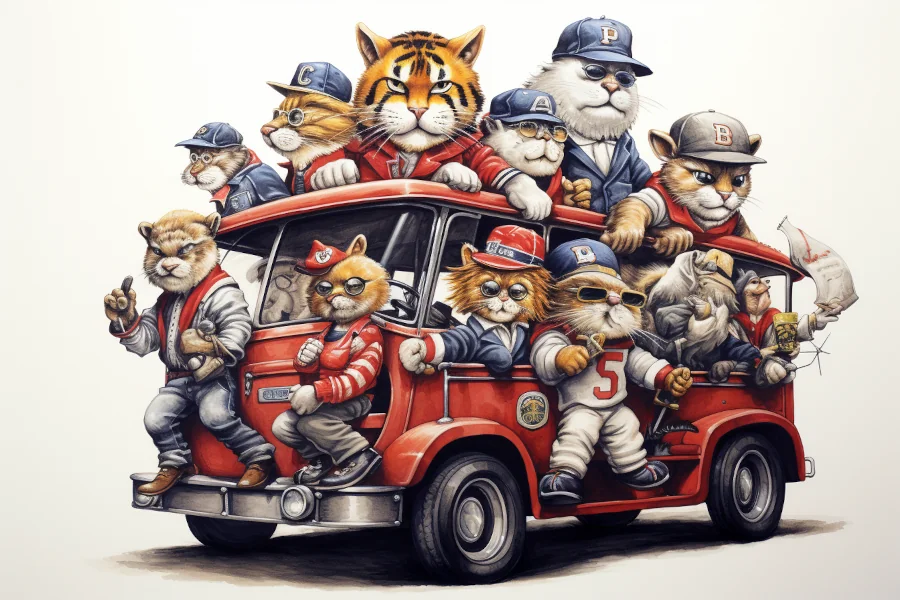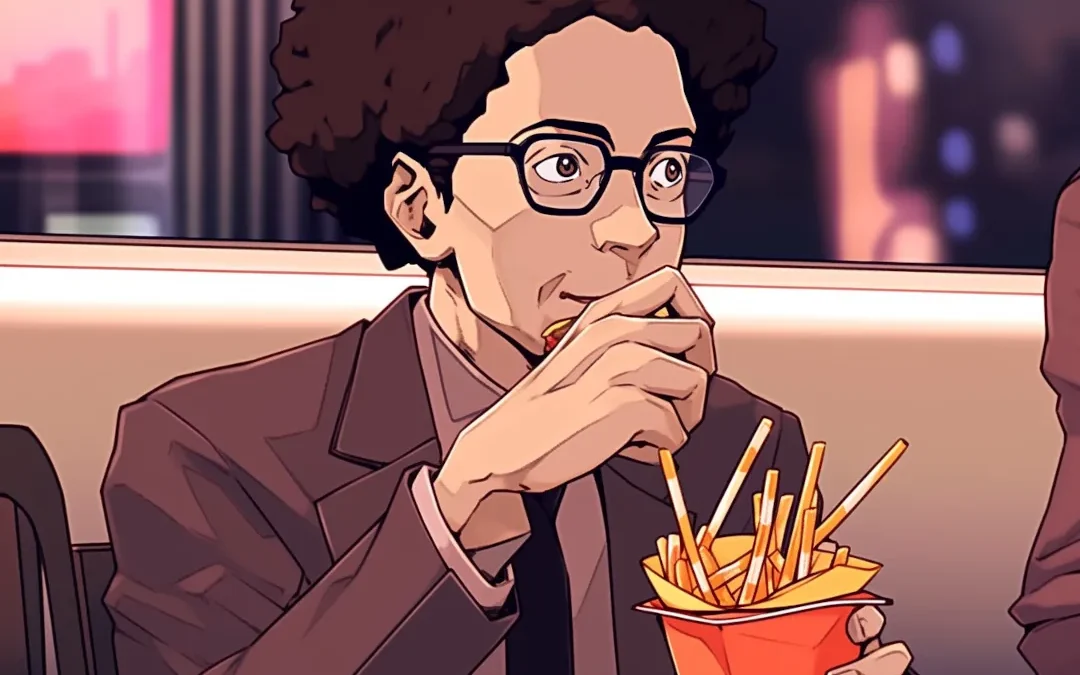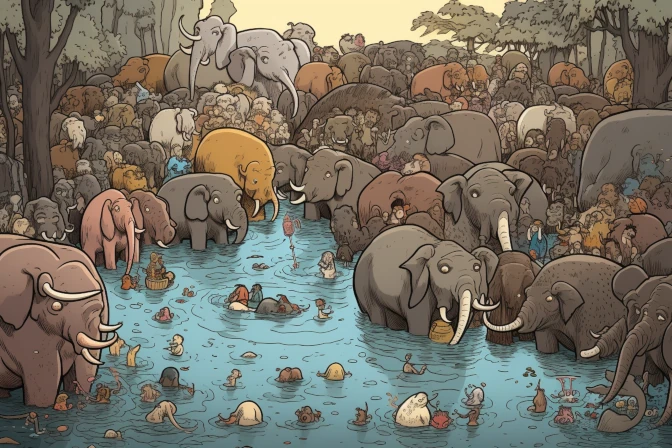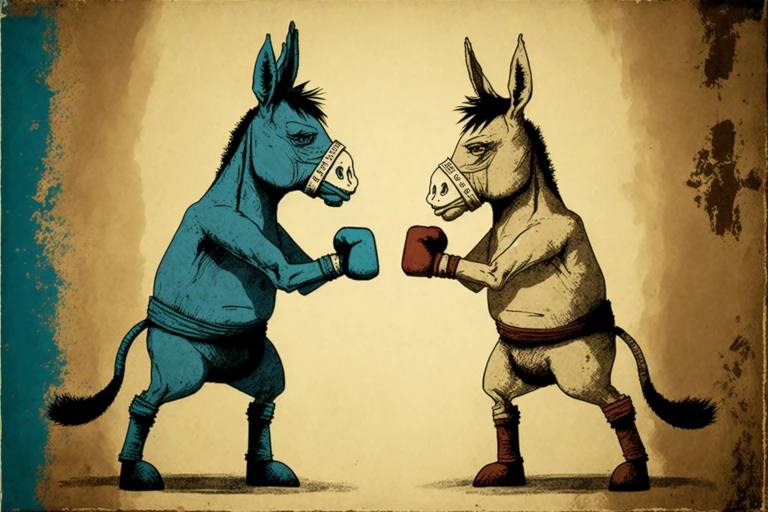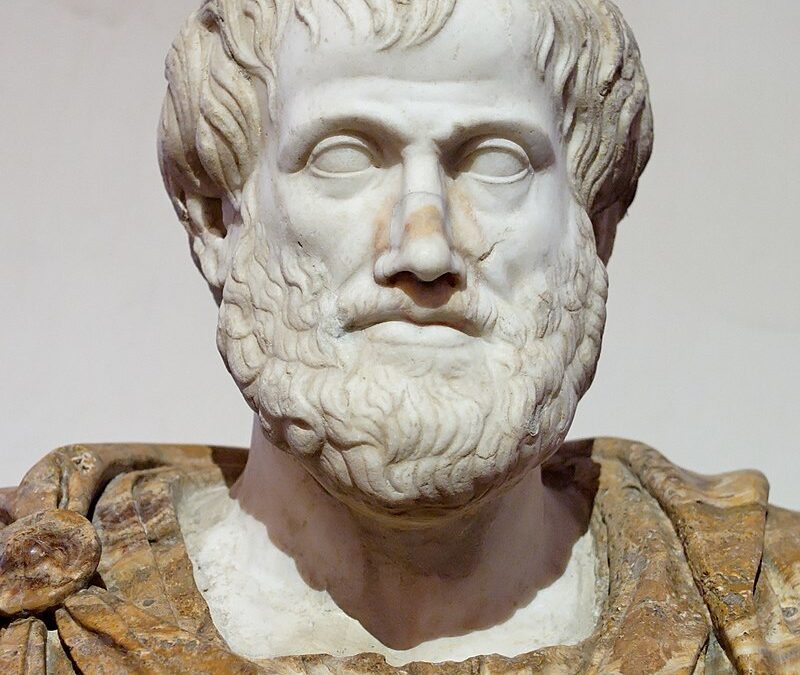Who doesn’t have a Gatsby paper? My interpretation of The Great Gatsby is not the most conventional view, so you may find this paper about Nick Carraway to actually be a unique take. I wrote this for Dr. Davis’ “20th Century Literature” class at Wittenberg for my undergrad degree. I probably put way more effort into this paper than I needed to for the grade, but I’m glad I did. Writing it helped me mature as a writer. It also provided me the opportunity to articulate how I feel about The Great Gatsby, a novel I always had strong opinions about. This version has been lightly edited.
In a letter to Moran Tudury, F. Scott Fitzgerald described his new novel, The Great Gatsby as “a new thinking out of the idea of illusion.” The novel clearly toys with notions of perception. Fitzgerald frequently details images of eyes, as epitomized by the billboard for Doctor T.J. Eckleburg, but this motif merely alludes to the central theme of non-visual illusions. Every major character, including the narrator, is plagued by some sort of illusion of the past that works as their personal antagonist. Tom, having achieved an “acute limited excellence” (10), seeks “the dramatic turbulence of some irrecoverable football game” (10). Jordan desires the gentility of her southern roots where affectation trumps honesty, allowing her to manipulate those around her.1 Daisy seeks an adulthood with both the security and romance of her debutante years only to be confronted with the fact that these two things are mutually exclusive. Gatsby’s pursuit of Daisy, to relive their past as young lovers, cannot escape one’s notice. Gatsby’s attempt to win back Daisy by way of material excess defines the novel and its theme. Daisy, as Gatsby’s illusion, personifies a vision of wealth and the supposed happiness it brings. The illusion of the book, however, is to disguise the importance of the narrator. Everything about Gatsby is so exaggerated—his history, wealth, possessions, parties, personality, passions, et cetera—that he functions as a decoy protagonist, an illusory tragic hero. Gatsby’s tragic end doesn’t wholly distinguish him from Daisy or Tom or Jordan, as they remain imprisoned by their illusions at the end of the novel. If anything, it makes him analogous to Myrtle Wilson, whose pursuit of an illusion leads to her tragic demise. Though illusions afflict all the characters, only Nick Carraway succeeds in identifying and overcoming the illusions that threaten to leave him unfulfilled like everyone else. This capacity to change creates a character arc unique to Nick, which not only marks him as the protagonist, but also demonstrates that the novel is not one of despair but one of hope.
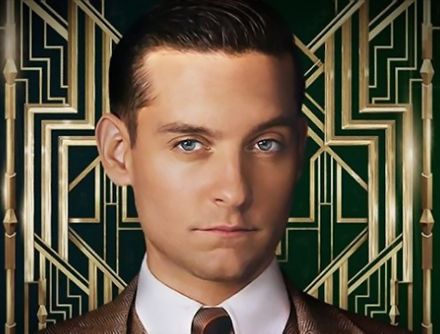
Nick begins the novel by telling the reader about his capacity to reserve judgement, which he describes as “a matter of infinite hope” (6). This infinite hope certainly makes Nick want to believe in Gatsby despite clear signs of his illusory nature. Gatsby doesn’t speak like a well educated gentleman, he speaks like a yokel impersonating a well educated gentleman. When Gatsby attempts to validate his past by flaunting the war medal and the Oxford picture, Nick clearly wants to believe in Gatsby but doesn’t. Nick notes clear signs of Gatsby’s dishonesty, such as by telling us that Gatsby claims to be from the Middle-West city of San Francisco. After Gatsby presents the war medal, Nick comments that his “incredulity was submerged in fascination” (71) and after Gatsby reveal the Oxford picture Nick goes so far as to say “it was all true” (71). Nick then imagines Gatsby in his palace surrounded by tiger skins opening up chests of rubies, which reeks of sarcasm. Understanding Nick largely hinges on making sense of what he believes and how he narrates the truth.
No scholarly consensus exists concerning Nick’s statement that “it was all true.” On one hand, it could reveal Nick’s susceptibility, showing him to be an unreliable narrator (Cartwright 223). Nick may also merely make a “humorous overstatement” (Donaldson 135) that demonstrates a desire to believe that cannot overcome an inability to do so. Neither Donaldson nor Cartwright view the success of the novel as contingent upon the success of Nick as a narrator. Cartwright concludes with the claim that “the failure of Nick’s narration is a failure of his will to believe” (231), while Donaldson bluntly asserts that he “is a snob” (131) and that neither Nick’s likability nor veracity are necessary to appreciate the novel (138-139). Nick’s belief or disbelief in Gatsby, in either case, tarnishes his character by making him gullible at best or pretentious at worst.
Donaldson’s interpretation that Nick is skeptical of Gatsby’s tale and merely wishes to believe seems more accurate and the evidence to suggests this to be true, such as Nick’s lighthearted thought later in the novel “to ask to see the rubies” (99). Both scholars miss that Nick’s belief in Gatsby doesn’t pertain to Gatsby’s wealth and doesn’t take form until later in chapter four. If money was all it took for a character to earn Nick’s reverence then he would be fascinated by Tom rather than Gatsby. As Donaldson rightly points out, Nick depicts Gatsby with an air of irony, filtered through a lens of propriety, much as he does with Tom throughout the entirety of the novel. He’s a curiosity Nick finds amusing. If anything, Gatsby’s a disappointment because “he had little to say” (69). Gatsby becomes “fascinating” when he attempts to convince Nick of the authenticity of his past, but Nick only realizes why Gatsby reached out to the green light across the bay when Jordan Baker tells him about Gatsby’s history with Daisy. Nick says, “[h]e came alive to me, delivered from the womb of his purposeless splendor” (83). At this point Gatsby becomes a mystery with substance, transcending his former status as a curiosity analogous to a haughty black family in a limousine. He now merits consideration rather than just a chuckle. Nick explains this early in the novel when he first describes Gatsby, saying:
If personality is an unbroken series of successful gestures, then there was something gorgeous about him, some heightened sensitivity to the promises of life, as if he were related to one of those intricate machines that register earthquakes ten thousand miles away. This responsiveness had nothing to do with that flabby impressionability which is dignified under the name of the “creative temperament”—it was an extraordinary gift for hope, a romantic readiness such as I have never found in any other person and which it is not likely I shall ever find again. (6)
The vast capacity for hope makes Gatsby such as spectacular and even heroic figure. Gatsby’s life of material excess and criminal activity and even Daisy, who Gatsby uses as a sort of muse, are all things for which Nick has an “unaffected scorn” (6). Regardless, he accepts Gatsby as inherently good not because his “infinite hope” aspires toward a noble goal, but because the hope is noble in and of itself. That Nick can identify this and empathize with it tells the reader just as much about Nick’s character as it does about Gatsby’s.
Not only does Nick’s attitude regarding Gatsby shift when he learns of Gatsby’s affection for Daisy, but his role in the action also shifts. We are told in chapter three that the events recorded so far “were merely casual events in a crowded summer” (60) and throughout these events Nick remains a passive observer. Work preoccupies Nick. He spends an hour every day studying the bond business and he dines at the Yale club despite it being “the gloomiest event” (63) of his day. Soon after, Nick takes a more active role. First he pursues a relationship with Jordan Baker and then he agrees to assist Gatsby in his pursuit of Daisy. Nick’s beliefs begin to take shape as desires and these desires manifest as actions.
The ambiguity of Nick’s desires in the East further reveal his character. He engages in the bond business because he “suppose[s] that it could support one more single man” (7). Regarding his service in World War I, Nick write that he “enjoyed the counter-raid so thoroughly that [he] came back restless” (7). This uncommon attitude among soldiers of WWI certainly doesn’t evoke the sort of miserly bloodbaths depicted in Remarque’s All Quiet on the Western Front. Enjoyment of a WWI counter-raid would seem to require a certain psychotic personality which has rarely been recorded, putting Nick in the unique company of Adolf Hitler and Ernest Hemingway. It also parallels Tom’s desire to find the thrill of a long lost football game. Upon his return the Midwest loses its status as “the warm center of the world” and instead becomes “the ragged edge of the universe” (7). Herein lies Nick’s illusion: that to feel alive requires some sort of thrill such as the one he discovered while in combat.
The pursuit of the thrill explains Nick’s disappointment when he finds Gatsby lacking in interesting conversation and why Gatsby reinvigorates this intrigue exciting but clearly fabricated stories. Nick lives vicariously, as Donaldson suggests (136), but he does so through known fictions like one who reads pulp novels or tabloid newspapers. The ambiguity of Nick’s desires distinguishes him from other characters. Gatsby wants Daisy, Daisy wants a combination of wealth and romance. Tom wants the excitement of sport. Myrtle wants Tom. George wants to provide for Myrtle. Everyone has a sort of green light except for Nick.
In a way, this makes Nick seem juvenile compared to his peers. Despite being on the cusp of thirty, Nick has just begun to establish his life. He’s found employment with a bond company but nonetheless relies on an allowance from his parents to maintain the type of bourgeoisie lifestyle to which he’s become accustomed. One can only assume that Nick’s time in the war delayed his maturity and despite is just now coming of age. From this view the novel can be viewed as a bildungsroman, which explains why compared to the other characters Nick’s desires are broad and ill-defined. When Nick suddenly realizes that it’s his birthday he thinks of it as “the portentous menacing road of a new decade” (143) stretched before him. Nick faces the great challenge of not truly knowing what he wants aside from some abstract feeling of excitement. This attitude puts him jeopardy of becoming an analog to Tom, who undoubtedly embodies the dangerous qualities Nick possesses.
In typical bildungsroman fashion, however, Nick functions as his own antagonist rather than some other character such as Tom. Both Daisy and Tom, as well as every other character affected by some limiting illusion, behave as examples of the pitfalls into which Nick may fall. Tom may be a horrible person but this doesn’t make him an antagonist to either Nick or Gatsby. He seems to stand in the way of Gatsby’s love of Daisy, circumstance reveals the illusory nature of this obstacle when Daisy, when forced to choose between her husband and lover, picks Tom. Concerning Nick, Tom doesn’t hinder his ability to succeed professionally, socially, or personally. If anything, Tom and Daisy both help Nick to mature and arrive at his moment of epiphany by being such blatantly poor examples of decent human beings. The story is one of man versus self, where Nick and every other character must face an inner demon that distorts objective reality in such a way that the inevitable recession of their respective green lights will lead to disappointment.
Nick pursues multiple avenues toward fulfillment because, unlike Gatsby, he hasn’t settled on a singular object to project his desires upon. In Jordan Baker he seeks romantic fulfillment, but finds her public persona equally attractive. Concerning her public persona, he says he “was flattered to go places with her because she was a golf champion and everyone knew her name” (62). He also finds her to be intriguing on a personal level. His epiphany that Jordan is “incurably dishonest” (63) ignites a “tender curiosity” (62) in Nick which prompts him to break off ties with his girlfriend out west despite the fact that he “wasn’t actually in love” (62) with Jordan. Nick describes his first kiss with Jordan thusly:
Unlike Gatsby and Tom Buchanan I had no girl whose disembodied face floated along the dark cornices and blinding signs and so I drew up the girl beside me, tightening my arms. Her wan scornful mouth smiled and so I drew her up again, closer, this time to my face. (85)
As is common with coming-of-age protagonists, Nick tests the waters of life in search of something fulfilling to which he can attach himself. He makes this explicitly clear to the reader as he describes himself in the beginning of the novel, saying that he will “become that most limited of all specialists, the ‘well-rounded’ man” (8-9). Evidently, at the time of narration, Nick has come to view the Renaissance man lifestyle as one of folly, declaring that the former statement “isn’t just an epigram—life is much more successfully looked at from a single window” (9).
This, perhaps, presents the greatest obstacle to recognizing the transformation in Nick; it’s acknowledged throughout the text, most prominently in the first chapter, whereas such a change usually lies in wait for the climactic moment in a novel such as Holden Caulfield’s epiphany at the end of Catcher in the Rye. While Nick waits for the end to elaborate on the rationale for his change, he lets the reader know it’s coming. In the very first chapter Nick tells how he went from being a man who frequently encountered “privileged glimpses into the human heart” (6) to one who wants “the world to be in uniform and at a sort of moral attention” (6). He reveals the magic of Gatsby, his “extraordinary gift for hope” (6) as well as Nick’s “unaffected scorn” (6) for everything Gatsby represents. Nick makes it abundantly clear that both his beliefs and desires have changed dramatically since he left West Egg.
There are, however, some clear instances where the chronology underscores the transformation in Nick, such as his perception of himself as honest. When he accuses Jordan Baker of being “incurably dishonest” (63) he goes on to make the opposite claim about himself. Nick claims that “[e]veryone suspects himself of at least one of the cardinal virtues” (64) and that honesty is his. Jordan somehow has some insight into Nick’s self-image and she finds this quality to be an attractive counter-balance to her own recklessness. In her final meeting with Nick where the two attempt to reconcile their past, Nick responds to this assertion with a clear contradiction: “’I’m thirty,’ I said, ‘I’m five years too old to lie to myself and call it honor.’” By this point Nick has evidently changed tremendously.
Nick also breaks the chronology of the story to give some details of Gatsby’s past with Dan Cody at a point in the story when Nick has yet to learn the truth of Gatsby’s past. He does so “with the idea of exploding those first wild rumors about his antecedents” (107) but he could have done so at any time. Nick notably does this soon before Tom begins to interact with Gatsby. Tom’s suspicions regarding Gatsby’s identity unsettle Nick. The strategic defense of Gatsby’s past at this time in the narration functions to justify Nick’s growing empathy with the man. This is a clear change from Nick’s earlier skepticism when he finds the artifacts of Gatsby’s past to be unconvincing. At this point in the story, Tom’s accusations of Gatsby’s untrustworthy nature may seem more convincing than Nick’s intuition that some sort of nobility resides within him. Nick has already provided the reader with enough information to support Tom’s allegations with the introduction to Meyer Wolfsheim and Jordan’s tale about Gatsby as a young soldier. The story of Dan Cody doesn’t totally absolve Gatsby of suspicion—nor can it—as he’s undoubtedly a criminal. It increases the mystery surrounding his character as it reveals his humble upbringing, which armors him in the reader’s eyes from Tom’s attacks. Nick has identified a goodness in Gatsby that makes him want to believe in the man even though at this point he probably cannot logically justify the feeling. When Gatsby successfully defends his claim of having attended Oxford, Nick wants “to get up and slap him on the back” and has a “[renewal] of complete faith in him” (136). Old Nick would completely agree with Tom that Gatsby cannot possibly be an Oxford man owing to the fact that he wears a pink suit. New Nick wants to believe that an Oxford man can wear a pink suit precisely because it underscores the “obstina[nce] about being peasantry” (93).
While the changes in Nick’s beliefs and desires happen throughout the novel, only in the final chapter, an epilogue of sorts, does Nick’s transformation fully come to light. This moment he made the reader aware of from the very beginning happens subtly, understated. When Nick sits on Gatsby’s beach looking out to the bay the transformative moment occurs:
And as I sat there, brooding on the old unknown world, I thought of Gatsby’s wonder when he first picked out the green light at the end of Daisy’s dock. He had come a long way to this blue lawn and his dream must have seemed so close that he could hardly fail to gasp it. He did not know that it was already behind him, somewhere back in the vast obscurity beyond the city, where the dark fields of the republic rolled on under the night.
Gatsby believed in the green light, the orgastic future that year by year recedes before us. It eluded us then, but that’s no matter—tomorrow we will run faster, stretch out our arms farther.…And one fine morning—
So we beat on, boats against the current, borne back ceaselessly into the past. (189)
Nick’s previous fascination with Gatsby has, at this point, transformed into understanding and this understanding applies to himself and everyone in the world. He has uncovered a universal truth that affects every human. Gatsby’s dream—Daisy—was not “commensurate to his capacity for wonder” (189). The fatal illusion for Gatsby was his firm belief that obtaining Daisy would be nothing less. What makes Gatsby such a spectacular fellow so esteemed in Nick’s eyes has nothing to do with the object of his affection but the way in which he pursued it. Indeed, Gatsby is “worth the whole damn bunch put together” (162) because of his “gift for hope” (6). Perhaps a better, albeit less romantic, illustration of Gatsby’s heroic “gift for hope” is presented by his boyhood schedule and list of general resolves. His mistake was placing Daisy on that list, but the list itself and the discipline to see it through makes Gatsby “Great.” Nick, a man of ambiguous ambition and Renaissance pursuits has, at this moment, learned a great deal from Gatsby.
Although he has learned this on the final page, it seems fitting considering the structure of the novel that he acts upon it several pages before. Nick provides a seemingly irrelevant anecdote about returning home from college on Christmas break. There at the train station he would meet up with old acquaintances and go to dinner, going out into the cold, “unutterably aware of [their] identity with this country” (184). Nick has come to realize that he is “a part of that” (184) and the East will always have a quality of distortion for him like an El Greco painting. He concedes that he may have “some deficiency” that makes him “subtly unadaptable to Eastern life” but the West is a place with “real snow, our snow” (184). By returning home, Nick doesn’t chase some lost thing from the past, he frees himself from the illusions of the East. He’s not chasing the thrill of the battlefield, the social status one receives from dating a minor celebrity, the drunken revelry of nouveau-rich parties, or a promising career in the field most popular with his peers. The West provides a sense of community and security, but most importantly it provides a sense of reality. Perhaps it will provide Nick with the right atmosphere, given that he’s “rather literary” (8), to put pen to paper and tell the world what he’s learned from his summer living next to the Great Jay Gatsby. After all, what else could be “commensurate to his capacity for wonder” (189)? So the novel ends with a sense of hope. The type of hope one experiences while weathering the cold Midwestern Decembers, undeterred by the biting winds that pierce the thickest of coats, because Christmas awaits around the corner. Though it may be easier and more comfortable to stay at home by the fire, people go out and carol and decorate and celebrate their hope. This is the hope we have for Nick, the hope he perceived in Gatsby and now takes on himself.
Works Cited
Cartwright, Kent. “Nick as an Unreliable Narrator.” Papers on Language and Literature (Spring 1984).
Donaldson, Scott. “The Trouble with Nick.” Critical Essays on F. Scott Fitzgerald’s The Great Gatsby. G.K. Hall & Co., 1984. 133-139.
Fitzgerald, F. Scott. The Great Gatsby. Charles Scribner’s Sons, 1925.
Fitzgerald, F. Scott. “To Moran Tudury.” 11 April, 1924. Critical Essays on F. Scott Fitzgerald’s The Great Gatsby. Hall & Co., 1984. 226.
Fryer, Sarah Beebe. “Beneath the Mask: The Plight of Daisy Buchanan.” Critical Essays on F. Scott Fitzgerald’s The Great Gatsby. G.K. Hall & Co., 1984. 153-166.
Neuhaus, Ron. “Gatsby and the Failure of the Omniscient ‘I’.” Modern Critical Interpretations: The Great Gatsby. Chelsea House Publishers, 1986. 131-139.
Scrimgeour, Gary J. “Against The Great Gatsby.” Twentieth Century Interpretations of The Great Gatsby. Prentice-Hall, 1968. 70-81.
Thale, Jerome. “The Narrator as Hero.” Twentieth Century Literature, vol. 3, no. 2, 1957, pp. 69– 73. www.jstor.org/stable/441004.
1For an in depth analysis of Jordan and Daisy’s southern affectations, see Fryer, 156.

